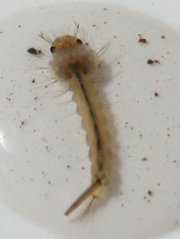SYMPTOMS:
Regular mosquito bites cause reactions in the bite area with swelling, redness and itching. It will disappear within a few days.
However with West Nile virus, some people experience flu-like symptoms (ongoing fever, muscle weakness, stiff neck, confusion, severe headache, sudden sensitivity to light, extreme swelling or infection at the site of the mosquito bite) while others don't show any symptoms. As the risk of becoming very sick is still possible it is important to recognize the symptoms and minimize the contacts with the disease.
TREATMENT:
The Public Health Agency of Canada states that there is no treatment or cure for West Nile virus; people with serious condition will be treated in hospitals or nursing facilities in order to ease their symptoms and prevent complications.
There is currently no licensed vaccine in Canada against West Nile virus.
AVOIDING MOSQUITO BITES:
While going camping or doing activities outdoors:
Repair or replace old screens in the windows, doors and vents of tents, tent-trailers cabins and RVs.
Use a dining tent with mosquito netting to enjoy protected outdoor living during mosquito season.
Use mosquito netting when sleeping outdoors or in an unscreened structure.
Avoid hiking, walking or sitting in areas where mosquitoes are likely to rest and breed (leafy underbrush, wetlands, stagnant water, and riverbanks).
Cover up when mosquitoes are most active: wear long sleeves, pants, hat, socks, and shoes.
Clothing should be loose and of light colour.
Avoid using scented body products that could attract mosquitoes.
Protect young children by covering infant carrier/stroller with mosquito net when outdoor.
Invest in bug suit if staying for an extended period in an area where mosquitoes are very active.
Use insect repellent with DEET (with no more than 10% DEET for children over 2 year old and 30% for adults, no DEET for children under 6 months).
Important note concerning DEET: Health Canada advises that DEET-containing repellents are not to be used on children under 6 months of age. It recommends that, where there is a high risk of complications to the child from insect bites, DEET may be considered for children aged 6 months to 2 years. Use sparingly, avoid the face and hands, apply only once a day, and use the least concentrated product (10 per cent or less). Health Canada also advises not to apply DEET more than three times a day to children between 2 and 12 years of age.
CONTROLLING MOSQUITOES:
Mosquito larvae will develop as adult in standing water, even in the smallest amount. Here are some suggestions from Interior Health to limit mosquitoes' breeding sites around the house or campsite; the list is not exhaustive:
Dispose of, turn upside down, or drill holes in tin cans, plastic containers, old flowerpots or similar water-holding containers.
Clear out dense vegetation and eliminate decaying debris.
Change water in birdbath twice a week.
Clean up your eaves troughs so there is no stagnant water.
Don't let water stand for more than 3 days
Clean, chlorinate and circulate outdoor pools and hot tubs.
Remove water that collects on pool covers
Check flat roof frequently for standing water.
Turn over compost frequently.
REPORTING DEAD BIRDS:
If you find fresh dead birds (crows, ravens, magpies, jays) with no sign of injury, call the West Nile Virus Line at 1-866-300-0520 during mosquito season.



